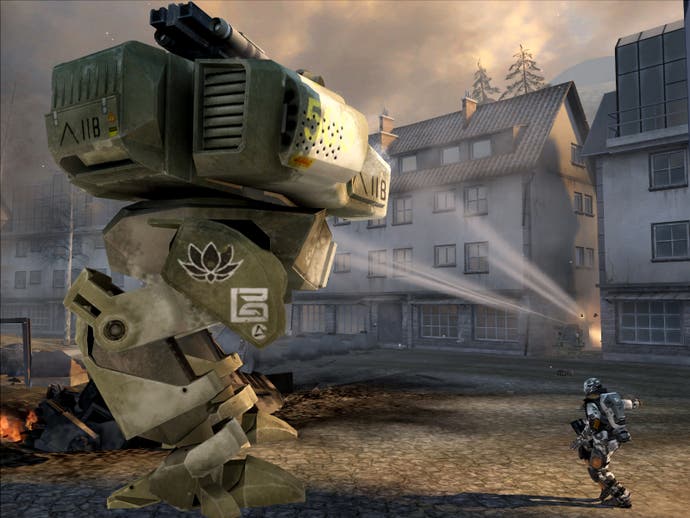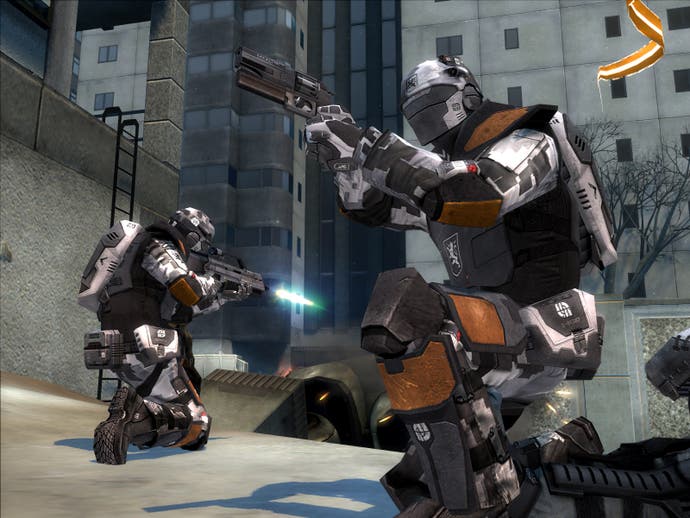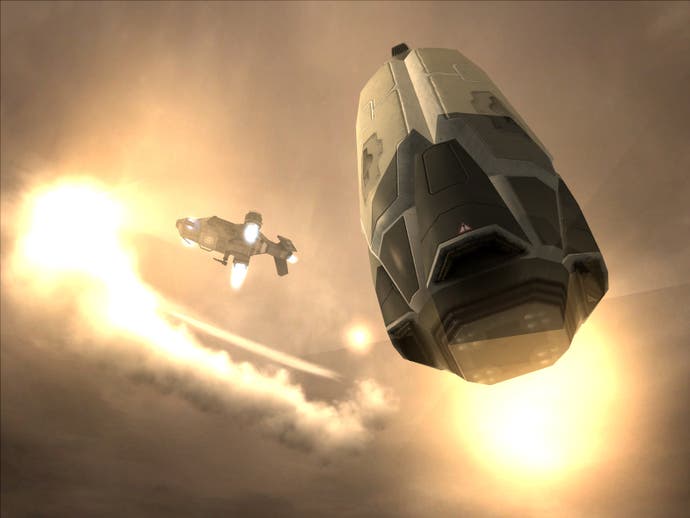Battlefield 2142
With Walkers more vicious than our own John.
Battlefield 2142 is a game from the future, although perhaps not in the way you imagine.
Built around the trusty chassis of Battlefield 2, its relationship with that game is similar to the one Battlefield: Vietnam shared with Battlefield 1942 - it puts a different slant on the action and so plays quite differently, even though it's fundamentally cut from the same cloth. The phrase "glorified mod" has been uttered in certain cynical quarters. It is, basically, Battlefield 2... but in the future.
Its generic setting is probably one of its weaknesses. Multiplayer games like Halo 2 - founded on a coherent single-player experience - have a sense of world. Here, it's just a mass of semi-science-fiction elements joined together. The idea that this is actually over a hundred years in the future never really comes across. On the one hand we have ultra-science like the Titans, floating fortresses that hover over the battlefields, which may as well be moonlighting in-between Star Trek shoots. On the other, a lot of very normal-looking projectile weapons. You can't quite put the two together, never mind the assortment of robot-walkers (ED-209's generally lovely big brother), little buggies and hover-tanks.
In play though, you forgive it, if only because all the vehicles control in as lovely a fashion as ever.
In terms of what actually matters, and despite the enormous floating Titans, the importance of air power has been downplayed since last time out. Yes, there are transports and gunships, but they don't appear to dominate anywhere near as much. The conquest game (conquer areas and hold them) remains from BF2. There's also a new mode centred on destroying the opposing team's Titan. In this mode, you battle to control missile-launch positions, which fire projectiles at the enemy every so often for as long as you hold them. Once the enemy shield is down, you can either maintain the barrage or - for a quick kill - actually board the aerial leviathan and fight your way to its reactor. The later tactic is highly reminiscent of some of the best bits of the interior action in PlanetSide, moving between cover points trying to take out control panels.

The new classes have been streamlined. And that really is streamlined. Classes have been merged. The Recon character is a mixture of Sniper and Special Forces trooper, for all your sneaky needs. The Engineer takes both anti-vehicle and vehicle-protection roles. The Support class has a mass of suitable high-tech tricks, most useful in - as the name suggests - helping out other people, although a personal force field's clearly a boon. Finally, the Assault class merges the infantry powerhouses with the Medic's troop-support roles. But despite each of the classes' swollen responsibilities, they're still easy to get the hang of, because most of their toys need to be unlocked first.
There's always a feeling with a multiplayer-centric game that you can only get a sense of how it's going to turn out after giving the community a couple of months to chew the game thoughtfully in its mouth. That feeling's especially strong with Battlefield 2142 due to a couple of its more controversial innovations. And it's these which are the true future settings.
The first is game-related: the massively increased reliance on unlockables.
Battlefield 2 introduced the idea of a player gaining in rank, and so gaining more equipment. This was successful because while it was useful to have the greater choice of weapons gained by extended play, not having them didn't alienate newcomers too much. It's different here. The four classes each have masses of upgrades. In fact, some of the abilities you'd consider intrinsic to earlier classes must be purchased to begin with. For example, while the assault class is able to perform basic healing duties, resurrecting the recently dead like the Medic used to do requires an upgrade. Since there are so many more unlockables available, you move through ranks quicker than you did in Battlefield 2, but it does start you off with a relatively limited array of assets.

How is this going to play out? We just don't know. To be honest, I think this is an abominable one. From my perspective, it's a case of either starting playing now or not playing at all, because if you arrive later when there are far more experienced people playing... well, it's going to be disheartening. It's bad enough in a multiplayer shooter when you find yourself being outplayed. While cheating in shooters is common enough, accusations of cheating by disgruntled players are far more common. Introducing a mechanic where someone else is just better in absolute terms seems like a betrayal of the genre, which is based around competition of skill not persistence. Just because World of Warcraft has seven million people playing it doesn't mean that every game should become World of Warcraft.
Or I may just be getting old.
That said, there are advantages to this approach. As mentioned earlier, just dumping the full array of abilities on someone would actually be confusing, but this way the game slowly opens up to you, with each of these abilities being yearned for and then experimented with. Equally, you get to personalise according to your play style. (Although, that's kind of based on the assumption that you don't want to swap to a tactically more suitable class at any point. Sorry - that's back to being mean to it again.)
The second change is the in-game advertising. We've seen this forever, of course, but there's something about it being in a fantastical setting rather than a real-world one which grates slightly. There's been a "Spy-Ware" furore around the game, which appears to be over-reacting (the idea that they'll be examining cookies has been denied by EA). That said, there are going to be lots of adverts across the level. At the time of writing, there are only placeholders where the adverts will be. If they're smart, they'll do some clever faux-futuristic adverts for whoever coughs up the money, and make it fit into the game's world. But "smart" and "advertising" don't often go together. It'll be worth paying attention when the real adverts start arriving, because it could provide a fatal blow to BF2142's already not-entirely-solid atmosphere.

There are a few other problems. Battlefield 2's performance has always been questionable, but there's a distinct extra hit when playing the Titan games. EA only officially supports Titan games up to 48 players - rather than the normal 64 maximum - and I found performance to be lacking even on 48, especially if you get involved in a Titan Defence.
It's easy to be downbeat with BF2142, which makes it worth reiterating that it's built around the core of one of the genuine great games. In fact, at its best, BF2142 is entirely on par with it, with some uniquely brilliant moments of its own: being propelled through the sky in a drop-pod, the warzone spread out before you like a bloody tapestry; stalking between buildings in the turret of a walker, scanning for targets; or even, on foot, following one of these mechanical beasts, and - for a moment - actually feeling like you're in some strange war in the future. But, when you come down from a battle, you find yourself with more questions and nagging doubt than lasting elation.
Battlefield 2142 may be a glimpse of the future of games. I'm just not sure that I like it.

